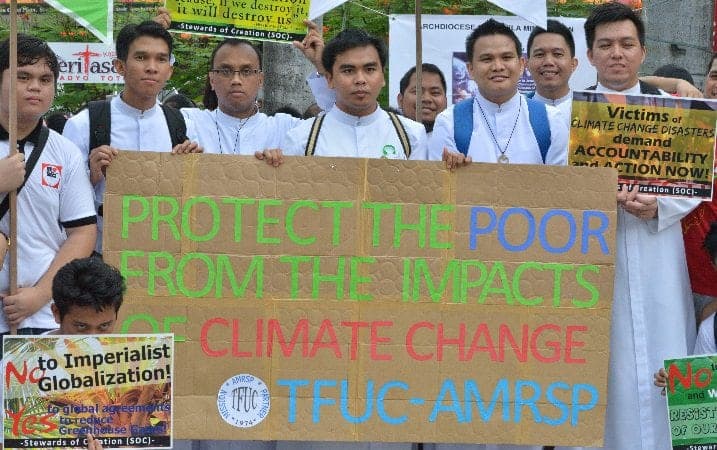An NPR story raised eyebrows last week with this provocative headline: “Should We Have Children in an Age of Climate Change?”
The piece focuses on the work and views of Travis Rieder, a philosopher at the Berman Institute of Ethics at John’s Hopkins University. His “small family ethic” questions the idea that having children is a good thing, particularly in the age of climate change.
“Maybe we should protect our kids by not having them,” he said. Americans are the biggest contributors per capita to climate change—so, given the seriousness of our ecological crisis, Reider argues we shouldn’t see the addition of new Americans as something to celebrate.
Put more succinctly: “The climate crisis is a reproductive crisis.”
Rieder’s argument is hardly new. It goes back at least to Paul Ehrlich’s 1968 book The Population Bomb which predicted that overpopulation would cause all kinds of dramatic ecological and nutritional crises during the 1980s, resulting in the deaths of hundreds of millions of people.
It is also taken to be something close to gospel in academic contexts that overpopulation is a grave ecological threat. In fact, one of the few sustained negative responses to Pope Francis’ Laudato Si’ came from academics who believed his concern for the climate crisis missed the reproductive crisis.
The journal Nature actually published a commentary from Ehrlich in which he called the pope’s approach “raving nonsense.”
That kind of rhetoric may indicate that the following critique from Francis has hit close to home, especially in the world of the privileged US academy:
“To blame population growth instead of extreme and selective consumerism on the part of some, is one way of refusing to face the issues,” the pope wrote. “It is an attempt to legitimize the present model of distribution, where a minority believes that it has the right to consume in a way which can never be universalized, since the planet could not even contain the waste products of such consumption.”
It is certainly easier for academics to focus on other people’s reproductive practices than it is to resist the ways we actually contribute to climate change: travel for conferences and vacations, eating meat, buying stuff online, etc.
The pope is right that many of those calling for population control want to place the focus on something other than the fact that their privileged lifestyle is made possible by the consumerist economy responsible for climate change.
Such economies, in fact, are strongly tied to lower population rates. As cultures get more and more addicted to wealth creation and efficiency, this concern crowds out procreation of children.
The most dramatic contributors to climate change, it turns out, are cultures with dramatically falling population rates.
Indeed, we just discovered that the United States now has the lowest fertility rate in the history of the country. But during this time where our population rate declined we also learned that our carbon emissions rates rose.
The relationship between a falling population rate and climate emissions, perhaps somewhat paradoxically, is the opposite of what Rieder and many other academics imagine it to be. Furthermore, human attempts at population control (one of several prescient warnings offered by Pope Paul VI in Humane Vitae) have something less than a stellar historical record.
One could, of course, point to the eugenic proposals and programs (also quite popular in American academic circles) of the first half of the 20th Century as deeply problematic. But from early 5th Century Rome to late 20th Century China, attempts to artificially raise or lower the population rate just don’t go as the planners planned.
We are seeing similar struggles in the 21st Century as many different countries have a collective freak out about their dramatically lower population rates. Many have passed generous tax incentives to have children, and France is offering more substantial social support for families which have a third child.
The Russians have even invented a new holiday: the “Day of Conception.” Essentially everyone is given time off of work to go home and have sex in the hopes that it will help stave off Russia’s coming depopulation crisis.
You can be forgiven if you haven’t heard these and other depopulation worries. They are rarely discussed in our public discourse—which generally accepts the ‘overpopulation’ narrative without much critical analysis.
Indeed, when was the last time you’ve heard someone comment on the fact that, according to the UN’s own numbers, the world’s population will actually begin to decline within the next two generations?
So, no, the climate crisis is not a population crisis. Pope Francis is right: it is a consumerism crisis.
And if we are to truly resist consumer culture, this requires adopting a posture of welcome and hospitality to the lives which unexpectedly cross our path. Using the consumerist playbook of cutting ourselves off from anything which will hinder economic growth simply feeds the climate change beast.
Instead of encouraging a US culture—already inhospitable to life—to become even more inhospitable to life, academics like Rieder should follow the pope’s advice and focus instead on patterns of consumption. It is the fight to change these patterns where the battle over climate change will be won or lost.

















